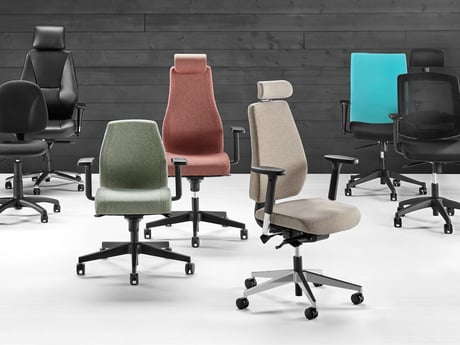How to choose the right pallet truck

A pallet truck is an essential tool in any logistics process, facilitating handling of stock in warehouses, loading of transport vehicles and receipt of goods. Getting the right pallet truck will make a significant difference in the efficiency of your business and improve the health and safety of your employees.
The first thing to consider is the primary purpose of the pallet truck and whether you have any special requirements. Then you need to calculate the average size and weight of the loads that need to be handled. This will enable you to purchase the best pallet truck for your needs.
Here are some of the most important features to consider.
Operation
There are several different types of pallet truck, catering for all pallet sizes and allowing for different types of pallet handling and lifting.
1. Standard hand pallet truck
Most standard pallet trucks lift between approximately 85 and 200 mm off the ground. A variety of fork lengths and load capacities are available. If you are looking for a pallet truck for day to day handling of standard UK or EUR pallets in a warehouse environment then this type of truck will probably cater for your needs.
2. Specialist hand pallet truck
These include rough terrain pallet trucks designed for use outdoors on construction sites, farms, etc. to deal with the uneven ground; printer’s pallet trucks designed for use with the half size pallets common in the printing industry; low profile pallet trucks to fit under pallets that are lower to the ground; and stainless steel or galvanised hand trucks for use in more demanding environments.
3. Electric pallet truck
Electric pallet trucks require less manual effort from the operator than standard hand trucks. The lift and drive mechanisms are controlled electronically. Heavy-duty models can handle heavier loads than a hand truck.
4. High lift pallet truck
High lift pallet trucks (also referred to as scissor lift pallet trucks) help to prevent repetitive back strain when loading or offloading pallets by hand. The scissor lift mechanism raises pallets to a more ergonomic working height.
5. Pallet truck scales
Pallet scales have all the same features as a standard hand pallet truck with the addition of in-built scales, allowing the user to lift and weigh loads in a single operation. This helps to save time and maximise warehouse efficiency when weighing palletised goods prior to shipping or storage.
6. Rough terrain pallet truck
Designed to move palletised goods over rugged and uneven ground, rough terrain pallet trucks are ideal for farms, work sites, plant nurseries and other outdoor locations too challenging for ordinary fork lifts or hand pallet trucks. The ergonomic design makes it easy to move pallets and outsize, irregularly shaped loads smoothly.
Size
One of the most important things to be aware of is the size of the pallets most commonly handled in your warehouse. The standard UK pallet size is 1000 x 1200 mm. To accommodate this type of pallet you need a pallet truck with a width across the forks of 680 mm. However, EURO pallets are 800 x 1200 mm and are very common for any businesses that trade with the EU. These pallets require a smaller width across the forks of 540 mm. Both types of pallets suit a standard fork length of 1150 mm. Adjustable forks are available if you need to be able to switch between different pallet sizes.
Wheels
Pallet trucks will come with the option for single or tandem wheels in a range of different materials each best suited to a different purpose and area of use.
Nylon
Nylon is exceptionally hard wearing and is idea for use with heavy loads and on hard floors. It offers low rolling resistance on smooth floors, making loads easy to move, and will not leave marks. However, nylon wheels can be noisy on uneven floors.
Polyurethane
PU wheels are well suited to floors with sawdust or grit as the additional friction will not damage the wheel. They also run smoothly and quietly on uneven floors. Polyurethane is resistant to oils, grease and chemicals.
Rubber
Rubber wheels run even more quietly than polyurethane. They are shock absorbent and offer good traction. However, rubber wheels are not suited to heavy loads.
Single vs. tandem wheels
Single fork wheels are suitable for lighter loads on even floors and are best suited to EUR pallets. Tandem wheels will support heavier loads, roll easier on uneven floors and are recommended when handling UK pallets, which have a closed fork pocket.
Weight and load
Your pallet truck should have a load capacity capable of handling the maximum weight of goods you expect to lift. Most standard hand pallet trucks will have a weight capacity of between 1500 and 3000 kg. Heavy-duty electric trucks may be able to handle heavier loads.
By getting the right pallet truck your can streamline your logistics process and protect staff from injuries caused by incorrect handling. Remember to check the guarantee of the product you are purchasing to ensure that the pallet truck will stand up to your demands and provide good value for your business.


